
![]() Printable page in A4 size
Printable page in A4 size ![]()
Open Future Health Blog
Your habits when you are in your 40's and 50's are the foundation for your good health and fitness at 85. Improved diet is the low cost alternative to extensive medical intervention later in life. The body has the ability to heal itself, if we treat it with respect. ANYBODY who adopts a healthy diet, at ANY AGE, will benefit, and as the months go by, those benefits will multiply.
April 2017 - 7 items
Australian Video about Sugar in the Diet
Dr Maryanne Demasi investigates the bitter truth about the dangers of a sweet diet. This is an old video, it is saying things that must have been controversial at the time. For most people this is still new understanding.
In only a few decades, there are now more obese people on the planet than there are undernourished. When it comes to getting fat, we've been TOLD, and most of us BELIEVE, it's as simple as 'calories in' versus 'calories out.' If you want to shed the kilos, you need to burn more calories than you consume. Most people think that means eat less of exercise more. These beliefs are just indoctrination; there's no science behind it, even if the person proclaiming that belief is a scientist, a dietitian, or a medical doctor.
The Problem with Sugar and other Carbohydrates
Video removed in this printed version
https://www.youtube.com/embed/whApfUVg8tc
Not all calories are the same. Some people absorb calories more efficiently and it matters what types of foods your calories are coming from. Sugar is the dietary villain that's making us fat and sick, as UK physiologist and nutritionist, Dr John Yudkin tried to tell us more than 50 years ago.
[From Wikipedia] From his book "Pure, White and Deadly" (1972). The last paragraph of Chapter 1 begins "I hope that when you have read this book I shall have convinced you that sugar is really dangerous."
That message was extremely unwelcome to the sugar industry and manufacturers of processed foods. These firms employed a number of methods to impede Yudkin's work. The final Chapter of Pure, White and Deadly lists several examples of attempts to interfere with the funding of his research and to prevent its publication. It also refers to the rancorous language and personal smears that Ancel Keys — the American epidemiologist who had proposed that saturated fat was the primary cause of heart disease — employed to dismiss the evidence that sugar was the true culprit. Keys wrote, for example:
"It is clear that Yudkin has no theoretical basis or experimental evidence to support his claim for a major influence of dietary sucrose in the etiology of CHD; his claim that men who have CHD are excessive sugar eaters is nowhere confirmed but is disproved by many studies superior in methodology and/or magnitude to his own; and his "evidence" from population statistics and time trends will not bear up under the most elementary critical examination."
The efforts of the food industry to discredit the case against sugar were largely successful, and by the time of Yudkin's death in 1995 his warnings were, for the most part, no longer being taken seriously.
Many Names for Sugar
| Agave nectar | Evaporated cane juice | Malt syrup |
| Brown sugar | Maple syrup | Honey |
| Cane crystals | Fruit juice concentrates | Molasses |
| Cane sugar | Glucose | Raw sugar |
| Dextrose | Maltose | Sucrose |
| Fructose | Crystalline fructose | Invert sugar |
| Corn sweetener | High-fructose corn syrup | Corn syrup |
Honey is not a more healthy form of sugar. Most sugars once in the body are processed in one way, they are converted into glucose, and used as energy with any surplus converted to adipose white fat deposits. All these sugars use insulin to enable their transport into body cells, or conversion into fatty acids.
Fructose and alcohol sugars often used a sugar substitutes, are metabolized almost completely in the liver in humans. This process avoids the insulin pathway. Fructose is directed toward direct replenishment of liver glycogen and to triglyceride synthesis. The products of fructose metabolism are liver glycogen and de novo lipogenesis of fatty acids (Fatty liver deposits).
Not Just Sugar
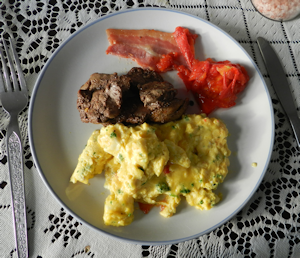 |
| Breakfast - Delicious |
|---|
The problem is bigger than sugar in the diet. All of the vegetable based foods we eat have a little carbohydrate in them. Grains are especially high in energy and despite all you've been told, relatively low in nutrition value. Grains are low cost, sources of calories. If you want to buy calories rather than nutrition grains are clearly the obvious best source.
Grain based foods are profitable. Take corn, the cheapest food on the planet, convert it into crunchy flakes, add some sugar and sell it for ten times what it costs to produce. There are hundreds of versions of that model, sold as bread, muffins, buns, biscuits, cakes, pasta, pastries, the sort of thing most people eat all the time. So much so that people can't imagine living without ANY of those foods.
For 30 years I ate a non-cooked breakfast. Muesli (sometimes with honey), low-fat yoghurt and fruit, with added low-fat milk. Occasionally supplemented by toast, margarine and peanut butter. This breakfast has a Heart Foundation good health "tick." Sadly, it's not healthy.
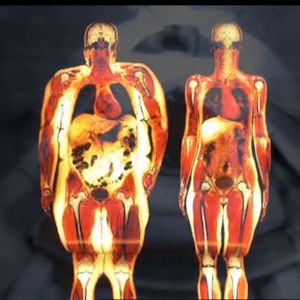 |
| Visceral fat causes organ malfunction |
|---|
Today, none of that content is part of my breakfast. My aim at breakfast is not to stimulate the production of insulin. Instead, I want to effectively continue my overnight fast, and also to eat well. The basis of breakfast is fatty meat and eggs. Vegetables are a desirable addition, avocado, tomatoes, mushrooms, kale, silver beet, or even lettuce. Offal meats or seafoods are a welcome addition.
If I eat any food at all with higher carbohydrate content, during the day, it's likely to be at dinner, in the evening. The only problem I have is at business meetings, morning or afternoon teas. Typically no real food is ever provided. Sometimes you can't even get real butter. This is disgraceful, but that's what's easy to do, and it's become what people expect. Obesity isn't in the person, it's in our whole society, in the way we all think. In what we all accept as "normal."
So we get fat, by making wrong dietary choices, sometimes because we seem to have no option. The most damaging fatness is invisible. Visceral fat; that is the fat created by your liver that collects inside and around your internal organs. As this fat builds up your organs find it more and more difficult to be efficient. Fatty liver has no symptoms until it gets quite serious, but that's 20 years after the problem began. We don't know how many people at age 50 have non-alcoholic fatty liver disease, because we never test for it, but maybe almost everyone. Dr Tim Noakes tells us that it's probably the most under-diagnosed problem in medicine.
On the basis of current statistics, young people today will live shorter lives than their parents. They are fat 20 years earlier than their parents, and huge numbers are diabetic. This is entirely unnecessary. But to make effective change, our whole society has to develop quite different ideas about what a healthy diet looks like.
Leading a Happy, Healthy Life
The Harvard Study of Adult Development has run for over 78 years. It began in 1938 as the W.T.Grant Study. Independently the Glueck study began the following year.
The W.T.Grant study of 268 elite men from Harvard, was intended to confirm the best ways of selecting managers for business or officers for the military. Both business and the military chose senior staff based on many desirable characteristics. In the course of fifty years the study proved that NONE of those characteristics have any predictive value. The list desirable characteristics in new leaders, still used today in most situations, are misleading. We usually choose the wrong people.
The Glueck Study, was of 456 young men from inner city Boston, men from the wrong side of the tracks mostly.
These two studies have become the Harvard Study of Adult Development — a study that has tracked the lives of 724 men, and is one of the longest studies of adult life ever done. Investigators surveyed the group every two years about their physical and mental health, their professional lives, their friendships, their marriages — and also subjected them to periodic in-person interviews, medical exams, blood tests and brain scans.
Video removed in this printed version
https://embed.ted.com/talks/robert_waldinger_what_makes_a_good_life_lessons_from_the_longest_study_on_happiness
Eighty years ago people believed that once one became "adult" that development ceased. That's not so, we continue to develop and grow throughout out lives. The previous director of the Harvard Study of Adult Development, was Dr George Vaillant. His most recent book is "Triumphs of Experience." Vaillant tells us that when he was 30, he became the director of the study. The men were 55-56 and Vaillant assumed that these men were already at the peak of their careers, and that their lives were already beginning to wind down. He admits that the next 30 years were to prove that he knew very little.
The present director of the study, is psychiatrist Robert J. Waldinger. He shared some of the major lessons in a popular TED Talk (What makes a good life? Lessons from the longest study on happiness). He says, "the government has invested millions of dollars in the research, but few people know anything about it."
The big takeaways from that talk: Good relationships keep us happier and healthier, and loneliness kills.
1. A happy childhood has very, very long-lasting effects.
Having warm relationships with parents in childhood was a good predictor that you'll have warmer and more secure relationships with those closest to you when you're an adult. Happy childhoods had the power to extend across decades to predict more secure relationships that people had with their spouses in their 80s, as well as better physical health in adulthood all the way into old age.
It took fifty years to show that the only predictive characteristic of effective leaders is very simple. As a child, did he have a strong loving relationship with his mother? It took even longer to expose the abuse of alcohol as the leading cause of divorces and professional or business failures.
And it's not just parental bonds that matter: Having a close relationship with at least one sibling in childhood predicted which people were less likely to become depressed by age 50.
2. But … people with difficult childhoods can make up for them in midlife.
People who grow up in challenging environments — with chaotic families or economic uncertainty, for instance — grew old less happily than those who had more fortunate childhoods. But by the time people reached middle age (defined as ages 50–65), those who engaged in what psychologists call "generativity," or an interest in establishing and guiding the next generation, were happier and better adjusted than those who didn't.
An unhappy childhood is a big barrier. But it's possible by choosing the right life partner, and by learning to love through your children, to heal the wounds of the past.
Continued in the next Blog entry.
Leading a Happy, Healthy Life (Part 2)
4. Time with others protects us from the bruises of life's ups and downs.
Waldinger has said "it's the quality of your relationships that matters" is one significant take away from the study. Looking back on their lives, people most often reported their time spent with others as most meaningful, and the part of their lives of which they were the proudest. Spending time with other people made study subjects happier on a day-to-day basis, and in particular, time with a partner or spouse seemed to buffer them against the mood dips that come with aging's physical pains and illnesses.
In Triumphs of Experience, George Vaillant explains how most people in their 70's and 80's are very happy in their marriages. Especially those who were able in their 50's and 60's to grow significantly in their ability to nurture younger people into leadership roles, were best equipped to develop new interests and activities that kept them engaged in interesting activities and involved with other people, late in life.
5. The Future of the Study?
Waldinger freely acknowledges how skewed their research group is — "it's the most politically incorrect sample you could possibly have; it's all white men!" ((In fact, the original group included John F. Kennedy.)) With "only a handful" of the original subjects left to study, the Harvard team is now moving on to the men's 1,300 children who've agreed to participate (a group that's 51 percent female). But he's painfully aware that the proposed cuts to the National Institutes of Health could end even their long-running study. "Our kind of research might be one of the first projects to go. Our work is not urgent; it's not the cure for cancer or Alzheimer's," he says. "But we have a way of understanding human life that you can't get anywhere else and it lays the foundation for important, actionable things."
Inflammation in the Body Revisited
I wrote about inflammation on Saturday, 8 April 2017 and Tuesday, 18 April 2017. I was telling the story that my very-low carbohydrate diet had reduced my inflammation if negligible levels and everything was under control.
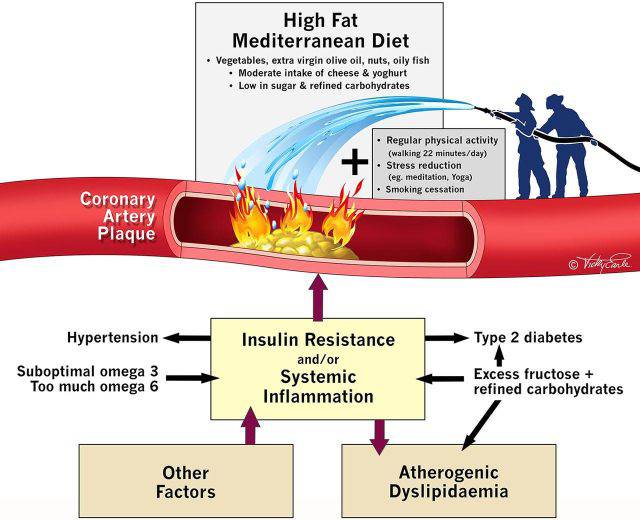 |
| Chronic Vascular Inflammation is caused by high Insulin levels in the blood. Click Image to enlarge |
|---|
You should never say things like that. It's the fruit season. There are free apples and pears and quinces. I've always enjoyed eating fruit. I wrote on the 8 April that excess fruit in the diet was probably the main cause of the chronic rash I developed in late summer 2014.
Early this month, I'm scratching at the varicose veins on my ankle. Then I had an itchy back in the shower and I used the back brush to give it a friendly rub. Why is my skin becoming itchy? It's inflammation in my body.
This didn't get serious, I acted on the warning sign. I've stopped eating fruit, and mostly the problem has gone. Not fully solved, but the inflammation is receding. Truth be known I'm also eating more than the 50g of carbohydrates I allow myself each day.
For me, not being diabetic, I can be a bit loose with my practice and I suffer very little. Insulin works, and now I might even be insulin sensitive again. So my weight is perfectly stable, at 75kg. My objective in maintaining ketosis is to minimise chronic inflammation. So; how do you do that?
If you read about reducing inflammation in the body you get conflicting information. Vegetarians are sure that the secret is to remove the meat from your diet. Vegan's go further and remove all dairy foods. I have no expertise here. I do have my own experience. There's lot of evidence that vegan and vegetarian diets are not healthy.
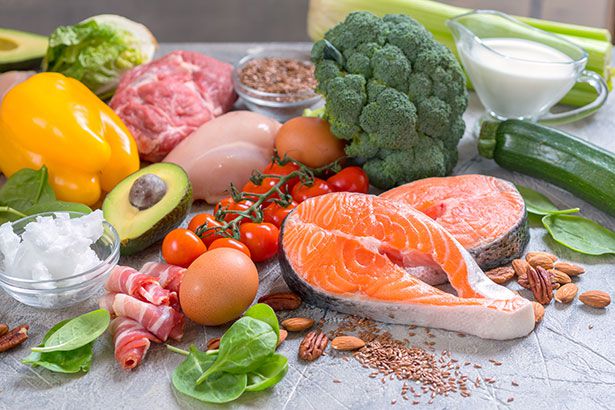 |
| Suggested Anti-inflammatory Foods |
|---|
We're not worried about the short term inflammation caused by exercise, or in response to infections or accidents. It's long term vascular inflammation that concerns us. If you suffer from any problem that's called xxxxitis, like arthritis, that is also caused by inflammation, and an anti-inflammation strategy should help you.
Reducing Chronic Vascular Inflammation
Let's deal with meat first. Meat in the diet does cause some inflammation, but it also has it's own anti-inflammatory properties. Net result zero, with the advantage of high density nutrition.
The most damaging high-inflammation foods are omega-6 vegetable oils. That's why you should stop eating margarine and butter substitutes, and look carefully at the ingredients in sauces and dressings. Some people believe that whole grains also cause inflammation. Gluten intolerance is one example. Many people report that although they are not made sick eating gluten, they seem better if they avoid it. So perhaps many of us are a bit gluten sensitive.
A similar story exists for dairy foods. It's not normal for most species to use milk as a food after weaning. Thousands of years ago, during famine, humans who were able to use lactose in their diet had a survival advantage. That's still in our genes. Most of us are lactose tolerant and we can eat dairy food without problems. I get a bit of a runny nose when drinking milk, but nothing else. There are great nutritional advantages if dairy foods are used, but some people can't, and they will know about that.
Evidence from the Harvard Study of Adult Development
George Vaillant reports that as the men in the W.T. Grant study reached their 80's study staff anticipated that dementia would be a serious problem. That wasn't the case. Most of the men developed vascular problems which became important health concerns.
"Of 189 "healthy men" at age forty, 103 had no risk factors, and 86 had one or more." Those 86 were already well on the way to worse outcomes. Poor health is created over many years, by the life choices you make.
Of the 86, "healthy men" who were less healthy at forty, 65 were either dead or chronically ill at eighty (76%).
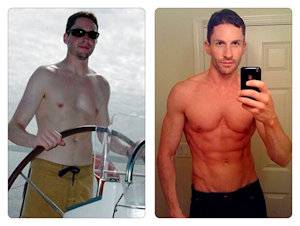 |
| Dr Ted Niaman Vegetarian Diet in his 20's Very-Low Carbohydrate Diet at 43 |
|---|
In contrast, of the 103 healthy men with no risk factors, at eighty, only 45 were dead or disabled. (45%) That's much better. Refer to the Dunedin Study where the biological age of people at 38 years of age was evaluated.
It's important to note what Vaillant was measuring regarding vascular risk factors. He lists smoking (significant), alcohol abuse (very significant), high diastolic blood pressure (very significant), obesity (very significant), type II diabetes (very significant).
Vaillant says; "The main causes of early death (before eighty) are vascular factors over which we have considerable control." Good health self-care before the age of fifty is something you can do. Stop smoking, avoid excessive alcohol or drug use, watch your weight, and control your blood pressure. If you just do that, your chances of being healthy at eighty are very good, according to Vaillant.
Factors that were insignificant in leading a long life may surprise you. They include; cholesterol level, exercise, parental social class, and psychological defence's. Getting a university degree was a very significant advantage in extending one's life (adding about 4yrs). The longevity of one's parents is irrelevant for most of us. However, for the extreme groups, the top 16% and the bottom 16% of ancestral longevity, there is a significant statistical advantage or disadvantage once you are over eighty. Late in life good genes might be an advantage.
To Exercise of Not to Exercise
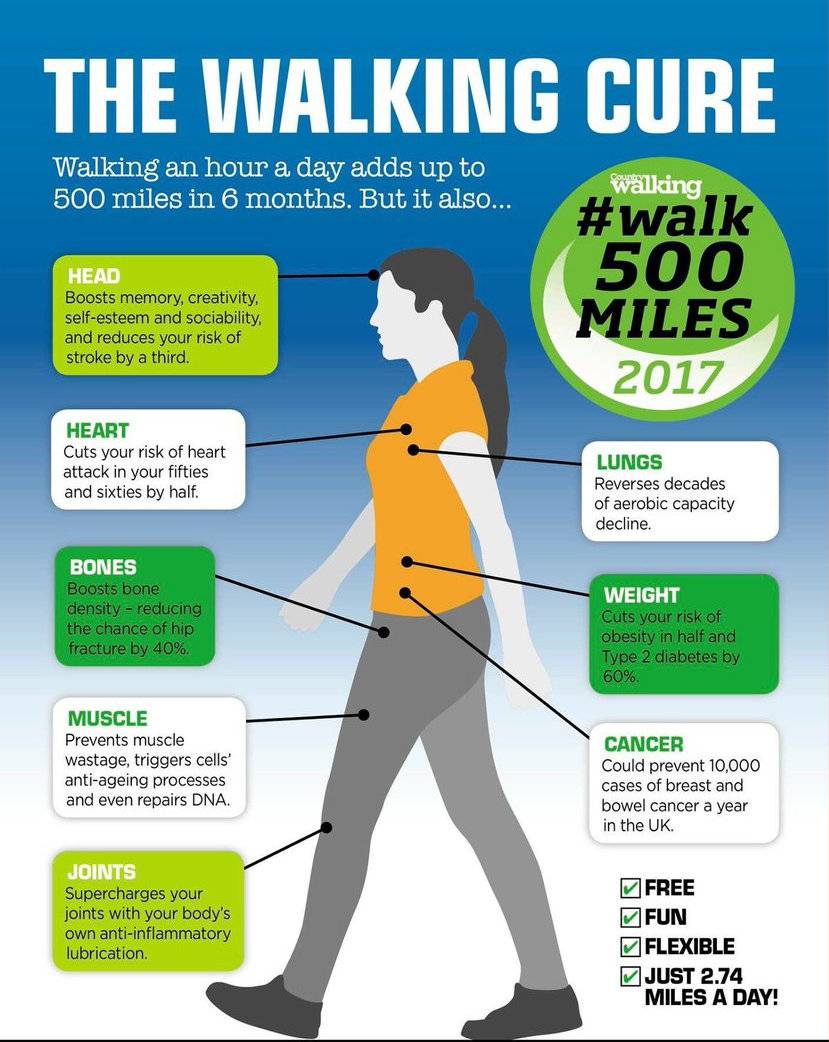 |
| Walking Daily is Life Saving |
|---|
There is a strong association between exercise and good physical health. Association does not imply cause. "Some things are horses and some things are carts," says George Vaillant. We might be wrong to assume that exercise is a horse.
In the Grant study, earlier good health was a good predictor of exercise at every older age. Good health at 55, was a good predictor of exercise at 60, and again at 80.
In contrast, those who were exercising at 60, correlated less well with both good health at 80 and exercise at 80. A habit of exercise throughout one's life, is helpful, but it's only significant, it's not a strong driver. In contrast, at every age good health predicts future exercise.
Before 1960, most people led quite active lives both at work and in personal activity. They didn't need to go to the gym. Doctors have been quite conservative in recommending exercise. They know that people can exercise and also be very unhealthy. But the reverse is never true, many people who are very healthy do not exercise. If Vaillant is right, these are the people who are likely to take up exercise in future.
The American NFL, give evidence of that. Players who are big people have and advantage if they are also fit. Too many successful NFL players, on retirement become very obese and die early, some before the age of 50. They were fit but not healthy.
There is value in exercise. Exercise, helps the body maintain homeostasis. Those who spend little time sitting each day have lower c-reactive protein markers. Exercise does do micro-cellular damage that causes inflammation. That mobilizes macrophage's to clean up the damaged tissues, and red blood cells, white blood cells, stem cells and platelets then repair the damage. The muscle gets bigger and stronger. Exercise also produces protective substances called cytokines like interleukin-6 which is anti-inflammatory when produced by muscle tissues.
Englishman, Prof. Jeremy Morris, studied bus drivers v ticket collectors, and postal workers comparing the postmen v office staff. His research demonstrated the exercise was protective against CVD. Morris said, "Exercise is the best buy in public health." He took up exercise himself, swimming, cycling and walking. He died at 99.
Prof. Ralph Paffenbarger in the USA, studied college alumni, and San Francisco Longshoremen. He came to the same conclusion, exercise had a powerful protective effect for one's health. At 45 Paffenbarger began to run marathons, he stopped running at 71. Five 100 mile runs and 151 marathons to his credit. He died at 84.
Please choose a screen size to return to the Index.